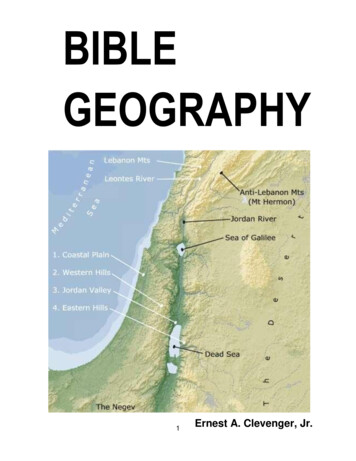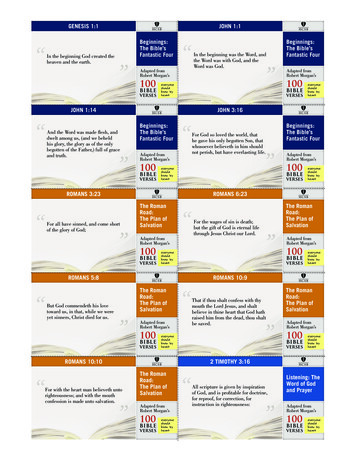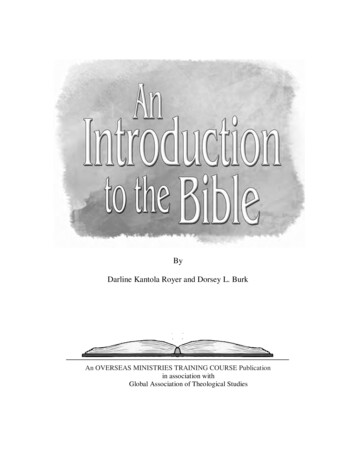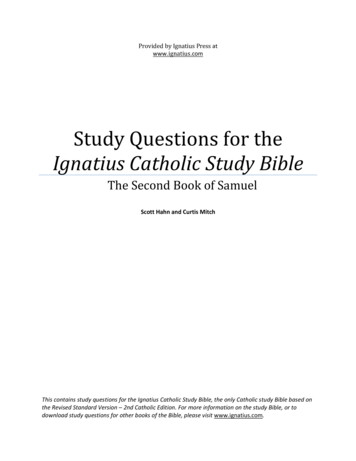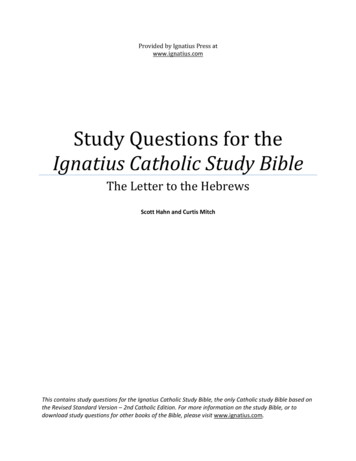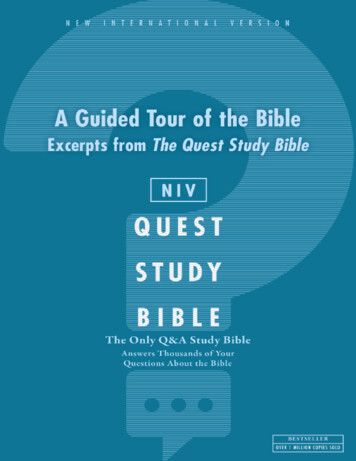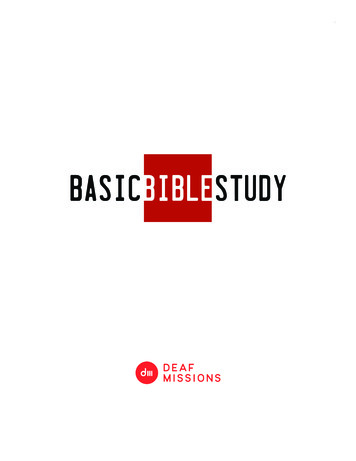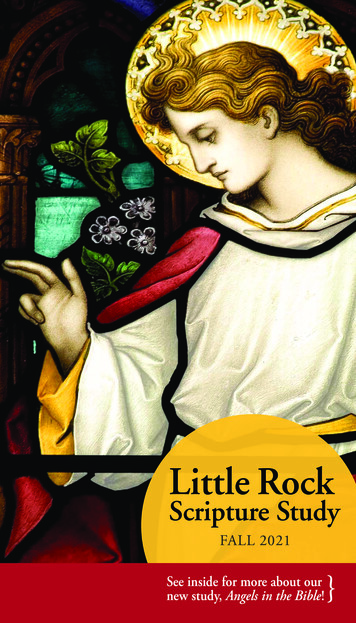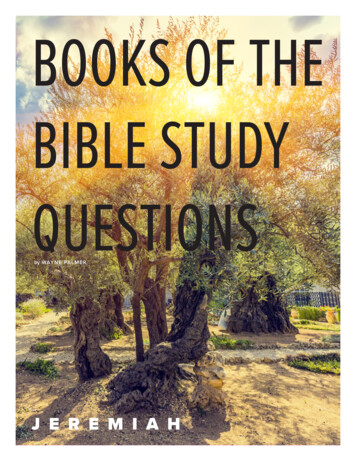
Transcription
BOOKS OF THEBIBLE STUDYQUESTIONSby WAYNE PALM ERJ E R E M I A H
Copyright 2018 Concordia Publishing House3558 S. Jefferson Ave., St. Louis, MO 63118-39681-800-325-3040 CPH.orgAll rights reserved. No part of this publication may be reproduced,stored in a retrieval system, or transmitted, in any form or by any means,electronic, mechanical, photocopying, recording, or otherwise, withoutthe prior written permission of Concordia Publishing House.Scripture quotations are from the ESV Bible (The Holy Bible, EnglishStandard Version ), copyright 2001 by Crossway, a publishing ministryof Good News Publishers. Used by permission. All rights reserved.Cover art: Shutterstock.com
INTRODUCTIONThe Book of Jeremiah focuses on God’s Word ofLaw and Gospel and the stubborn disobedienceof the people of Judah and their kings. It exposesthose sins with powerful law and judgment,prophesying the defeat of Judah at the hands ofBabylon and the Babylonian exile. But it showsGod’s incomparable grace, patience, and mercyas He reaches out to His people over and overagain, providing a way to survive as His people.Even after the destruction of Jerusalem, Hepromises that after seventy years in exile theJews will be permitted to return and rebuildJerusalem.PURPOSEJeremiah teaches us that God will judge andpunish unrepentant sin, but He is patient andlong-suffering, offering protection and salvationthrough the promised Christ.AUTHORSHIPThe Book of Jeremiah was written by theprophet Jeremiah around 628–580 BC.4. The Fall of Jerusalem and Related Events(Chapters 39–45)OUTLINEJeremiah can be divided into the following parts:1. The Call of the Prophet (Chapter 1)2. Warnings and Exhortations to Judah(Chapters 2–35)3. Suffering and Persecution of the Prophet(Chapters 36–38)5. Judgment against the Nations (Chapters46–51)6. Second Historical Appendix (Chapter 52)
DISCUSSION QUESTIONSTHE CALL OF THE PROPHET—JEREMIAH 1Before recording his divine call to be a prophet, Jeremiah introduces himselfand explains the historical context for his ministry.Read 1:1–3.Q 1:What is notable about the kings during whose reignsJeremiah prophesied?A 1:Jeremiah began his work as prophet during the reign of Josiah, thelast godly king of Judah. It continued through the reigns of Josiah’sthree sons and a grandson, the fall of Jerusalem, and among thesurvivors afterward.While Jeremiah was still a young man, God commissioned him to be Hisprophet. He informed the prophet that his would be a difficult ministry ofcalling for stubborn Judah to repent. God encouraged him with two visions andseveral promises of protection.Read 1:4–19.Q 2:Why is Jeremiah so intimidated when God calls him?A 2:Jeremiah is very young, from a small country town. But God tellshim simply to speak and promises to uphold his words.Q 3:What is implied in God’s statement, “They will fight againstyou, but they shall not prevail against you” (v. 19)?A 3:Jeremiah will definitely face resistance and persecution. He willwarn Judah of God’s judgment—and those to whom God sendshim will refuse to listen, to the point of being killed or carried offin exile. But God will make Jeremiah stand firm and prevent hisenemies from destroying him. As the book unfolds, we see God’sprotecting hand shielding His prophet over and over again.Q 4:Name some different ways we face the same opposition inour Christian lives.A 4:When we stand firm on God’s Law, His will for human life on Hisearth, we will face opposition, especially when we warn people oftheir sinful behavior. God does not want us to remain silent and letSatan easily claim their souls; instead, we are to speak up in genuinelove and concern for them with patience and gentleness.
WARNINGS AND EXHORTATIONSTO JUDAH—JEREMIAH 2–35EARLIEST PROPHECIES—JEREMIAH 2–6Much of Jeremiah plays out like a court trial where God is laying out chargesagainst Judah. Look for the imagery God is using to help the people of Judahunderstand the seriousness of their sin.Read 2:1–3:5.Q 5:What imagery does Jeremiah use to depict Judah’sunfaithfulness to God?A 5:He uses the imagery of an unfaithful bride—who would face capitalpunishment under Mosaic Law. Unfaithfulness in marriage is apowerful symbol because we can easily understand the wrath Godfeels when we fail to fear, love, and trust in Him above all things.A hundred years before the time of Jeremiah, the Northern Kingdom wasconquered and destroyed by Assyria while God spared Judah and its king,Hezekiah. Jeremiah urges the people of Judah not to think of themselves morehighly than they should.Read 3:6–4:4.Q 6:How does God use the imagery of sisters to try to turn Judahto repentance?A 6:The people of Judah felt superior to Israel because Israel’s openidolatry led to it being carried off into exile. God describes thetwo nations as sisters. He points out Israel’s faithlessness, but thenshows that Judah learned nothing from its sister’s fall, which shouldhave led to a recognition of its own sinfulness. Jeremiah uses thisimagery of sisters to show Judah that God still cared about them—and He was giving them time to repent so they would not suffercaptivity.Q 7:How might we be tempted to commit this same sin in our day?A 7:We can easily feel smug and superior to unbelievers. But whenour hearts are unrepentant and our confession is shallow andsuperficial, we deserve more wrath than they.After exposing that Judah’s unfaithfulness is worse than Israel’s, Jeremiahpoints to God’s judgment, which is coming quickly toward them in the form ofthe nation of Babylon. Look for the two terrifying images God uses to portraythe Babylonian armies.
Read 4:5–18.Q 8:What two images does God use to depict the Babylonians andstir His people to fear and repentance?A 8:He first uses a lion that has risen from its thicket and is headinginto their village. Then He describes a whirlwind or tornado—anapproaching storm that brings utter devastation.Q 9:How might those same images move us to godly fear andrepentance?A 9:They remind us that Judgment Day is coming upon the whole earth,a day of devastation and everlasting punishment for those who donot repent and trust in Christ.Jeremiah is called the weeping prophet because he shares the anguish he feelswhen he considers the needless destruction his people are bringing uponthemselves by their sins.Read 4:19–31.Q 10:How does Jeremiah’s own anguish show us the heart of God?A 10:God truly loves all the people He made. He desires for each of us torepent and live through Christ Jesus. Jesus demonstrated this sameanguish when He wept over Jerusalem after His triumphal entry(Luke 19:41).God challenges Jeremiah to go through the streets of Jerusalem and find oneperson who does justice and seeks truth that might pardon the city and spare itof judgment.Read 5:1–13.Q 11:What does Jeremiah find as he searches Jerusalem?A 11:No matter whom he looks at—rich or poor, low or high socialstanding—all have turned away from God. They swear by God’sname, but they swear falsely, giving no thought to God and Hisways.Q 12:What warning can we take from this?A 12:We can easily get swept away with the social status or standing ofcertain people (athletes, artists, politicians, the wealthy) and thinkthey are exempt from God’s judgment. But none of us are. Weall fall somewhere in that spectrum between the poorest and thewealthiest, the lowest and the highest in society’s estimation.Jeremiah addresses two particular sins nearly all those of Judah are committing.He wants them to repent and return to God.
Read 5:14–31.Q 13:What two sins does Jeremiah address in this passage?A 13:He addresses (1) their refusal to give up worshiping false gods and(2) their abuse of the weak and powerless.Q 14:What warning does Jeremiah threaten if they don’t stopmistreating the helpless among them?A 14:They will become weak and powerless and suffer the savageabuse and mistreatment of the Babylonians as they are taken intocaptivity.Q 15:Where do you see weak and powerless people being abused?A 15:Again God warns about the danger looming out of the north—theBabylonians. But the people of Jerusalem refuse to listen or turnfrom their evil ways.Read chapter 6.Q 16:What contrast do verses 16 and 17 show between God’s mercyand Judah’s defiance?A 16:God offers to bring rest for their souls, but they refuse to walkin His way. He advises His people to listen to the warning of theprophets as they would listen to the signal trumpet from thewatchmen warning of an invading army—but they refuse to listen.Q 17:How can we fall into this same pattern of disobedience anddefiance?A 17:When we justify our sins and disobedience, we do not feel the needto repent and run to Christ.THE TEMPLE MESSAGE—JEREMIAH 7–10Jeremiah attacks two more deep-seated spiritual problems in Judah—insincereworship and regarding the temple as a good-luck charm that made Jerusalemimmune from destruction. Notice Jeremiah’s words in verse 11; Jesus will speakthose same words when He cleanses the temple in Matthew 21:13.Read 7:1–29.Q 18:Why does God forbid Jeremiah to pray on behalf of thepeople of Judah?A 18:God’s time of grace is finished. Now they must bear thepunishment for the sins they commit. For this reason, we do not
pray for the dead: their hour of grace has passed; they are either inheaven through faith, or hell.Q 19:When might we be guilty of these same sins?A 19:We’re guilty when we warm a pew in the church, but our heart isfar away, relishing an unrepented sin to which we cling.Next Jeremiah sees the grievous sin arising from Judah’s insincere worship—child sacrifice. In 8:1, the word bones is repeated over and over. If you read thatverse aloud, dwelling on the word bones, it will sound like a funeral bell tollingthe death of Judah and Jerusalem.Read 7:30–8:3.Q 20:What could make the Jews do something as diabolical assacrificing their children?A 20:Their idolatry started small and got big. Child sacrifice arose whentheir situation got drastic and they felt they needed to make a hugesacrifice to win the god’s favor.Q 21:Describe a sinful habit that starts small but grows extremelysinful and destructive.A 21:Examples include going from experimentation with marijuanato full-blown drug addiction; internet pornography that leads toaffairs that destroy marriages; abusing animals that leads to abusinghumans.Jeremiah confronts the stiff necks and hardened hearts of the people of Judah,as well as their religious and political leaders. Set on a self-destructive courseof evil, they refuse to open their eyes and consider the wrath of God they arebringing on themselves.Read 8:4–17.Q 22:What does God mean in verse 8 when He says that “the lyingpen of the scribes has made it [the Law of the Lord] into alie”?A 22:The priests and teachers of the Law misrepresented the Scriptures,much as the scribes and Pharisees of Jesus’ day taught it as a bookof rules by which a person could earn heaven. They convinced thepeople that God was pleased with their conduct and encouragedthem to carry on in their sins.Q 23:What notice can we take from this in our own lives?A 23:Instead of justifying our behavior based on what other people do,we need to examine ourselves in the light of God’s Law that we maysee if we are walking correctly.Reading God’s stern condemnation of sin, it can become easy to forget Hisheart of love and mercy. In the next section, we see our heavenly Father’s heartbreaking for His wayward children who are heading toward disaster.
Read 8:18–9:26.Q 24:If God loves the people of Judah so much, why doesn’t Hegive them more time to repent?A 24:In every generation since the exodus, God sent prophets to warnHis people of their sin and turn them to faith. Delaying judgmentnow would only harden them in their unbelief and tighten Satan’sgrip on them. The only way to reach them was to allow devastatingjudgment to fall on them—their misery might open them to theHoly Spirit’s work of creating repentance and faith.Q 25:How might this explain why God allows us to pass throughdifficult times in our lives?A 25:God often permits us to suffer the consequences of our foolishchoices so we repent and realize the danger of our sinful path.Q 26:What caution must we keep in mind in such circumstances?A 26:Not every evil that we suffer in our life is a punishment orcorrection from God for some wrong we have done. Sometimes—like Jesus—we suffer from the hatred of evildoers.Jeremiah exposes the complete folly of God’s people who worship, sacrifice to,and pray to idols that were once trees standing in a forest.Read chapter 10.Q 27:What are some ways we make other gods for ourselves?A 27:It is easy to laugh at the people of Judah falling down before chunksof wood covered with gold. But consider how committed we canbe to sports, wealth, sex, friendships, power, science, medicine,and the like. We also put our confidence in our own gods that arepowerless to save us from harm, death, and eternal destruction inhell.COVENANT AND CONSPIRACY—JEREMIAH 11–13When Joshua conquered the Promised Land, the tribes gathered at Shechem torenew their covenant with God. They promised the Lord alone would be theirGod, and He promised to guide, protect, and provide for them (Joshua 24).Jeremiah explains how they conspired to break that covenant.Read chapter 11.Q 28:Why is intentional sin more dangerous than forgetfulness ormomentary weakness?
A 28:Intentional sin involves a conscious decision to break our covenantwith God. There is a great danger that we will harden our hearts,ignore our conscience, resist the Holy Spirit, and become secure inour sin over time.Jeremiah prays about a difficult test to his faith. Perhaps you have felt this sameway.Read 12:1–4.Q 29:What is Jeremiah’s complaint?A 29:God permits people who pretend to be faithful but are clearlydisobeying God and exploiting others to prosper and doesn’t callthem to account.Q 30:How would you answer someone who made this samecomplaint about God to you?A 30:Don’t let someone else’s behavior shake your faith; just keep yourfocus on God and His promises in Jesus Christ.The Lord answers Jeremiah’s complaint.Read 12:5–17.Q 31:Why has the Lord delayed punishment for these hypocrites?A 31:In grace, He is giving time for the Holy Spirit to work through HisWord by the prophets to create repentance and faith. But there is alimit to His patience. If they do not repent, they will be swept away.God uses a fresh, new loincloth as an object lesson for Judah.Read 13:1–11.Q 32:What was the lesson of the loincloth?A 32:The ruined state of the loincloth over time reveals the effects ofunrepented sin in a believer’s heart. In time, the former believer isruined and God will treat him or her as we treat worthless rags.God gives Jeremiah a parable for the people of Judah. As an empty jar mustbe filled with wine, Judah’s unrepented rebellion has filled the Lord’s wrathcompletely.Read 13:12–14.Q 33:In what way is drunkenness a powerful symbol of sin’s effectsand God’s judgment?A 33:Drunkenness makes a man stagger and stumble and renders himunable to defend himself. It is a dreadful thing to think of God’swrath let loose on sinners without His mercy moving Him to feelpity or compassion. But if we stubbornly, persistently reject thesalvation won for us by Jesus Christ, what else is left for us?Judah’s rebellion has become part of their nature, dooming them to exile.Read 13:15–27.
Q 34:How is Baptism a remedy to the effects of sin and rebellion?A 34:Sin is ingrained in our hearts. But working through Baptism, theHoly Spirit moves us to confession and faith. He gives us a newheart like Jesus’ heart.THE DROUGHT—JEREMIAH 14–15Jeremiah describes the devastating effects of a drought God has brought uponJerusalem because of the people’s stubborn, unrepented sins.Read 14:1–12.Q 35:What is Jeremiah’s response when God tells him not to prayfor the welfare of the people of Jerusalem?A 35:Like Abraham in Genesis 18:22–33, Jeremiah does not give up, butkeeps praying for the people of Judah who have been led astray bythe deceptive promises of the false prophets.Q 36:What can encourage us to pray for stubbornly unrepentantpeople who hurt us?A 36:We are encouraged by remembering that God loves all people anddoes not desire anyone’s eternal destruction. Instead, He laid thesins of all humanity on Jesus so forgiveness is available to all.Jeremiah expresses frustration over false prophets who contradict the Lord’smessage of punishment for unrepentant sinners and promise peace.Read 14:13–22.Q 37:What is the great danger of this false teaching?A 37:It reinforces their unrepentance and convinces them God is okaywith their sinful lifestyle, when in reality they are pushing awayGod’s grace and kindling His wrath against them.Q 38:Name some examples of false teachings that promise peacefor unrepentant sin.A 38:One example is churches that support same-sex marriage.God responds to Jeremiah’s prayer for the people of Judah and Jerusalem.Read 15:1–9.Q 39:Why is it significant that God mentions Moses and Samuel?A 39:Several times during the forty years in the wilderness, Godthreatened to destroy the nation of Israel (Exodus 32:7–14;Numbers 14:11–24), but Moses interceded and turned away God’swrath. Likewise, when the Israelites demanded a king, Samuelprayed and turned away God’s wrath (1 Samuel 12:16–25). ButJudah’s unrepentant sin is so much worse now, it demands God’s
just punishment—not even Moses or Samuel could cause Him torelent.Q 40:What should this remind us about Judgment Day?A 40:On that day, nothing will turn away God’s wrath againstunrepentant sinners. God will judge them justly.The stubborn resistance and opposition of the people of Judah wears Jeremiahdown. In discouragement, he lays out his troubled soul to God.Read 15:10–21.Q 41:Why did the people of Jerusalem hate Jeremiah so much?A 41:Because the people were unrepentant and secure in theirdisobedience, Jeremiah could only preach stern, unrelenting Lawand judgment. Speaking of God’s love and mercy would only makethem more secure in their sin.Q 42:How can a Christian find encouragement to witness in such ahostile environment?A 42:Reading God’s Word daily and receiving the Sacraments in regularworship helps maintain our heavenly perspective. Likewise,being active in Bible study gives us family members and friendswith whom to share our frustrations as well as give and receiveencouragement.DISASTER AND COMFORT—JEREMIAH 16:1–17:18Jeremiah is instructed not to grieve those who die of the famine. Thisdemonstrates what will happen when Jerusalem is captured. The dazed exileswill be dragged away from Jerusalem leaving their dead loved ones unburied.Read 16:1–13.Q 43:What kind of disaster is so devastating and perilous thatsurvivors are unable to grieve lost loved ones?A 43:Some examples are refugees caught in war zones; victims ofgenocidal attacks; and survivors of widespread natural disasterssuch as earthquakes, tsunamis, or hurricanes.Despite the devastating Babylonian invasion and the impending exile, God willmake His grace known to all people.Read 16:14–21.
Q 44:How was God able to show grace to His people while theywere captives in exile and impress the heathen nations whoheld them?A 44:Consider the first half of the Book of Daniel. God impressed thekings who held His people when He delivered His faithful servantsfrom fiery furnaces and lions’ dens.The Lord reveals the terrible nature of Judah’s sins to show He is just and rightto strike them with the severe punishment they will receive at the hands ofBabylon.Read 17:1–13.Q 45:“The heart is deceitful above all things, and desperately sick;who can understand it?” (Jeremiah 17:9). What does Godteach us in this verse?A 45:Unless God enlightens us through Law and Gospel, we cannotknow just how sinful we really are. We deceive ourselves intothinking we are pretty good people and God has no reason topunish us.As Jeremiah is attacked and slandered by those who are unrepentant, he praysfor God to vindicate him and grant him justice.Read 17:14–18.Q 46:What reaction does this passage show we should expectwhen we share God’s Law and Gospel with people?A 46:The Holy Spirit will move some to repentance and faith, but otherswill reject His work and react harshly and vehemently. This isbecause God’s Law has cut into their heart but they love their sinand refuse to turn from it.THE SABBATH AND ISRAEL’SIDENTITY—JEREMIAH 17:19–27One of the clearest indications of Israel’s spiritual health was how theyobserved the Sabbath. Jeremiah commands kings and commoners to stopworking and keep the Sabbath.Read 17:19–27.Q 47:How did continuing their daily work on the Sabbath harmIsrael’s spiritual health?A 47:God’s Word is the source of our spiritual strength and life. Settingaside our daily work to gather for public worship lets us feed onGod’s promises, be reassured of His forgiveness, and go back to ourdaily callings with confidence.
Q 48:What things tempt you to miss weekly public worship? Whyare our earthly preoccupations unable to keep us spirituallyhealthy?A 48:Options could include sports events, weekend activities, or feelingthe need to rest up from a busy week. None of these things feedsour spirit; only God’s Word and Sacraments do that.THE POTTER AND ISRAEL—JEREMIAH 18–20The Lord uses the example of a potter deciding how to work his clay toillustrate His sovereign authority to treat Judah however He chooses. Hethreatens disaster to bring them to repentance so He can spare them by Hisgrace.Read chapter 18.Q 49:What was the people’s response to Jeremiah’s message inverse 18?A 49:The people responded harshly, refusing to pay attention to hiswarnings.Q 50:Why is it hard for us to believe God’s warning, repent, andreceive His grace?A 50:When we don’t instantly see negative consequences for our sins, itcan be easy to continue in them and begin to doubt God will evercall us to account.Jeremiah breaks a clay vessel in a valley southwest of Jerusalem, a site wherethe Israelites sacrificed their children to false gods.Read chapter 19.Q 51:What is remarkable about God sending Jeremiah to preach tosuch criminals?A 51:Judah’s kings, nobles, and others were guilty of not just sins butheinous crimes: executing the very children the Lord had given andentrusted to them. We might consider such crimes unforgivable,yet God stands ready to forgive them.Q 52:What sins and crimes have you considered unforgivable? Howdoes Jesus’ suffering for those same sins shed a new light onGod’s amazing grace?A 52:Some might consider murder, rape, or some other terrible crime,even homosexuality. But Jesus was already punished on the crossfor those sins—so no such sin is unforgivable.
The religious leaders of Jerusalem respond physically to Jeremiah’s loving yetstern warnings.Read chapter 20.Q 53:How does this mistreatment of God’s prophet foreshadowJesus’ passion?A 53:Both were mistreated by the religious authorities in Jerusalem,whose stubborn, sinful, unrepentant hearts found no place forGod’s Word.CONDEMNATION OF KINGS,PROPHETS, AND PEOPLE—JEREMIAH 21–24Jerusalem is doomed—nothing will prevent it from falling to the Babylonians.But in mercy and compassion, God provides a way for the kings, prophets, andpeople to survive.Read 21:1–10.Q 54:What means of survival did God make available to the Jewishpeople?A 54:The Babylonians would show mercy and give life to any who wouldsurrender.Q 55:Why would it require great faith to surrender?A 55:Surrendering meant putting themselves at the mercy of a peoplewith a reputation of great cruelty. Surrendering demonstrated trustthat God would move the enemy to show compassion.Q 56:Describe a time you did something in faith that seemed to goagainst common sense.A 56:An example would be confronting a boss who is doing somethingthat is wrong, or confessing responsibility for a sin or failure whenyou could have gotten away with it.God challenges the king and his family to stop their evil deeds and to defendthose who were being mistreated by the wealthy and powerful in Jerusalem.Read 21:11–22:10.Q 57:What does this show about the sins for which God was goingto destroy Jerusalem?
A 57:While the great and powerful in Judah were mistreating the poorand powerless, the king and other judges failed to rule justly onbehalf of the victims.Jeremiah condemns the leaders’ obsession with gaining more wealth and powerat the expense of the innocent who were being exploited.Read 22:11–30.Q 58:Why is it hard for sinners to treasure people more thanthings?A 58:Our sinful nature is so turned in on ourselves that other peopleoften become objects whose sole purpose is to serve our selfishdesires.In contrast to the evil, selfish kings of Judah, God promises to raise up a newand righteous King—His Son, the promised Messiah.Read 23:1–8.Q 59:What hope can Christians who are persecuted and oppressedby corrupt, selfish government officials draw from Jesus’promised return?A 59:The time we will be subject to evil governments is limited—we willlive under Jesus’ perfect reign for all eternity.Judah’s slide into idolatry and immorality was spurred in large part by thereligious leaders (priests, Levites, and false prophets) who did not confronttheir sins and call them to repentance, but instead misled them with falseassurance that God would not punish them for their sin.Read 23:9–40.Q 60:How can you guard against Christian ministers and leaderswho fail to call sinners to repent, or who give them falseconfidence in their good works?A 60:We need to be persistent in our study of Scripture and test theteachings we hear to see if they line up with Scripture.By this point, a large group of Judeans have already been led off to captivityin Babylon (including Ezekiel and Daniel and his three friends). Jeremiahconfronts the snobbish attitude of those who remain and think they are betterthan their exiled brothers.Read chapter 24.Q 61:What thinking should we avoid when we see others goingthrough a difficult trial in their lives?A 61:That somehow this trial demonstrates God’s anger at some sin oftheirs. That is what Job’s friends did.
FORETELLING THE BABYLONIANEXILE—JEREMIAH 25–29It is the year 605 BC. Jeremiah reminds the people that God has been sendingprophets for twenty-three years—warning them of His impending judgmentand calling on them to repent—but they have refused to listen. Now God’sjudgment is at hand.Read 25:1–14.Q 62:How did the people of Judah abuse God’s patience?A 62:Even though He gave them nearly a quarter of a century to repent,they refused to listen. And it seems the long time without sufferingimmediate consequences for their sinful actions confirmed them intheir sin and injustice.Q 63:What similar danger do we face while awaiting Jesus’ secondreturn?A 63:Judgment Day may seem far off, and we might be tempted toindulge our sins, thinking there is plenty of time to repent. But onlyGod knows when the day of our death or Christ’s return will be.The wise person heeds God’s warnings instead of ignoring them.Jeremiah illustrates the effects of God’s wrath with a cup that makes peopledrunk.Read 25:15–38.Q 64:Why is drunkenness a good picture of the devastating effectsof God’s wrath?A 64:The Jewish refugees and exiles endured great suffering, disease,hunger, and affliction. When dragged off in chains into exile, theystaggered and reeled as if they were drunk.Q 65:How does this cup relate to Jesus’ death on the cross?A 65:In the Garden of Gethsemane, Jesus prayed, “My Father, if it bepossible, let this cup pass from Me; nevertheless, not as I will,but as You will” (Matthew 26:39). In His suffering and death onthe cross, Jesus completely emptied the cup of God’s wrath at allhuman sin.Q 66:What cup does Jesus now offer us instead of the cup ofwrath?A 66:He offers the cup of the New Covenant, which holds the blood ofChrist shed for the forgiveness of our sins.
Jeremiah stands in the temple courts proclaiming the coming destruction ofthe city and the temple if the people of Judah do not repent. The reaction of thepriests, prophets, and people is not unexpected.Read 26:1–15.Q 67:Why did the Jewish religious leaders charge Jeremiah withtreason—a capital offense?A 67:He preached the destruction of the temple and the city. Thissame charge was leveled against Jesus (threatening to destroy thetemple—see Matthew 26:59–62).Q 68:Why shouldn’t we be surprised when we receive hostileresponses when calling out sin and sharing the Gospel ofGod’s forgiveness in Jesus Christ?A 68:God’s Law is like a sword that cuts deep into our soul, exposing oursin. When people cling to their sins, they feel deep, defensive ragewhen their cherished sinful lifestyle is attacked.The Jewish religious leaders bring Jeremiah before wicked King Jehoiakim forexecution.Read 26:16–24.Q 69:How is this similar to the trials of our Lord Jesus?A 69:The Jewish religious leaders leveled charges of capital crimesagainst Jesus and brought Him before the ruler Pontius Pilate to beexecuted.Q 70:How did God spare Jeremiah’s life despite the wicked kingwho was his judge?A 70:God-fearing officials in Jehoiakim’s court recalled a precedent setone hundred years before when the prophet Micah predicted thedestruction of the temple under faithful King Hezekiah.God gives Jeremiah a new preaching prop—a wooden yoke—and a newaudience.Read chapter 27.Q 71:What does the wooden yoke signify?A 71:The yoke signified that all who heard should humble themselvesand serve Nebuchadnezzar, whom God had appointed to punishthe nations and govern them. All those who resisted God’s chosenleader would suffer the consequences.Q 72:What is different about the audience to whom Jeremiahpreached wearing this yoke?A 72:These are not only the people of Judah and Jerusalem, but alsoenvoys and representatives of small neighboring nations who cameto Jerusalem to discuss allying together against the king of Babylon.
Q 73:Describe a situation where a Christian might have to submitto an unbeliever to fulfill God’s will for his
WARNINGS AND EXHORTATIONS TO JUDAH—JEREMIAH 2-35 EARLIEST PROPHECIES— JEREMIAH 2-6 Much of Jeremiah plays out like a court trial where God is laying out charges


